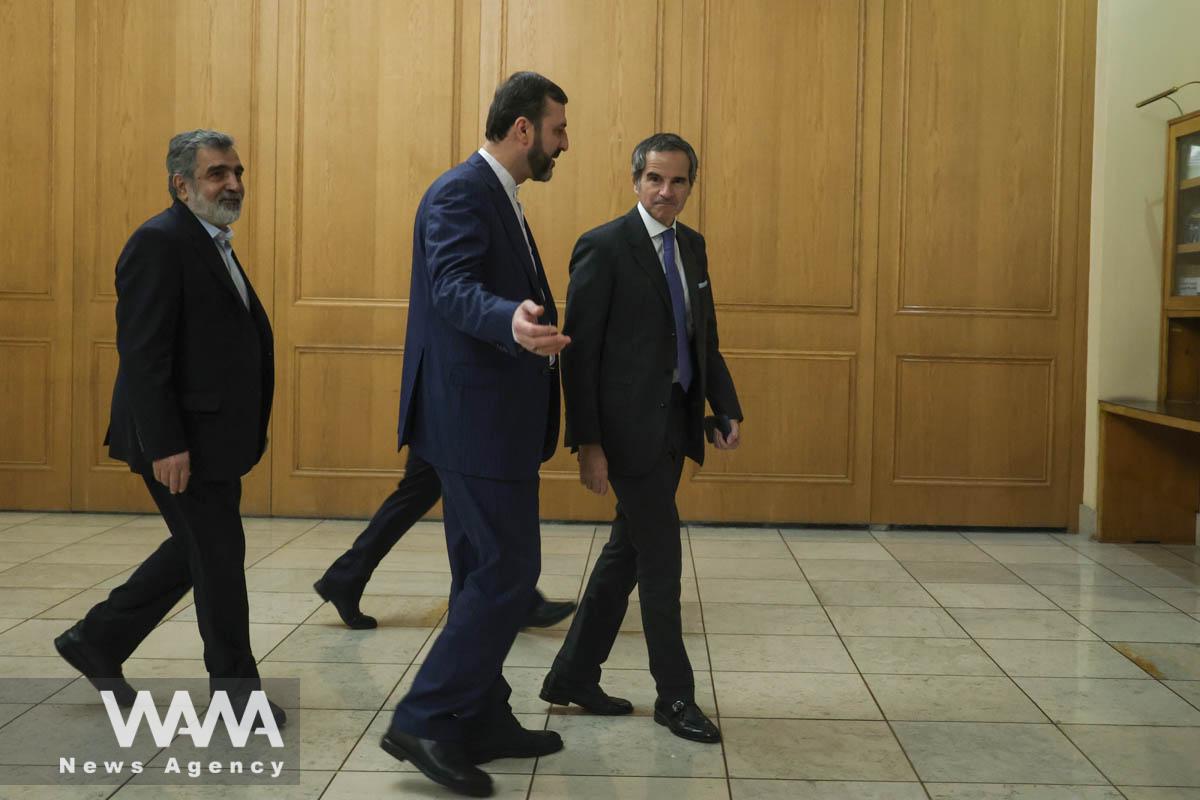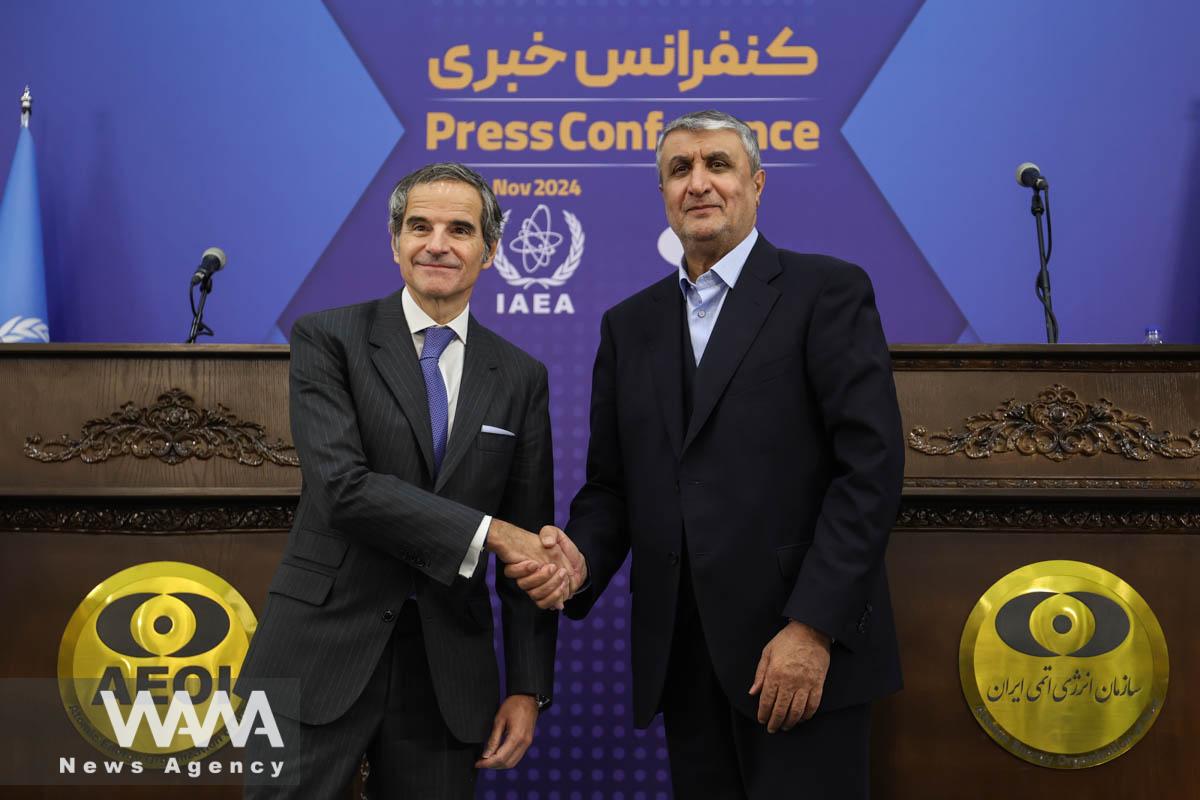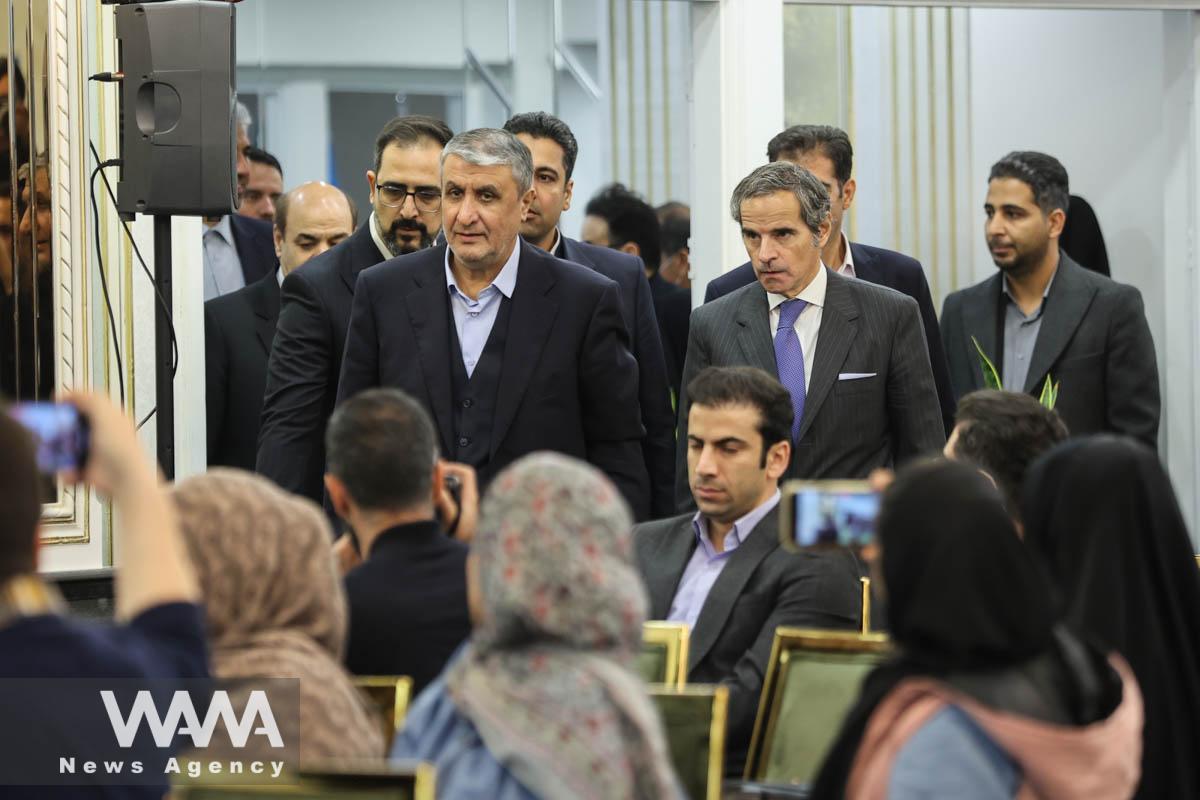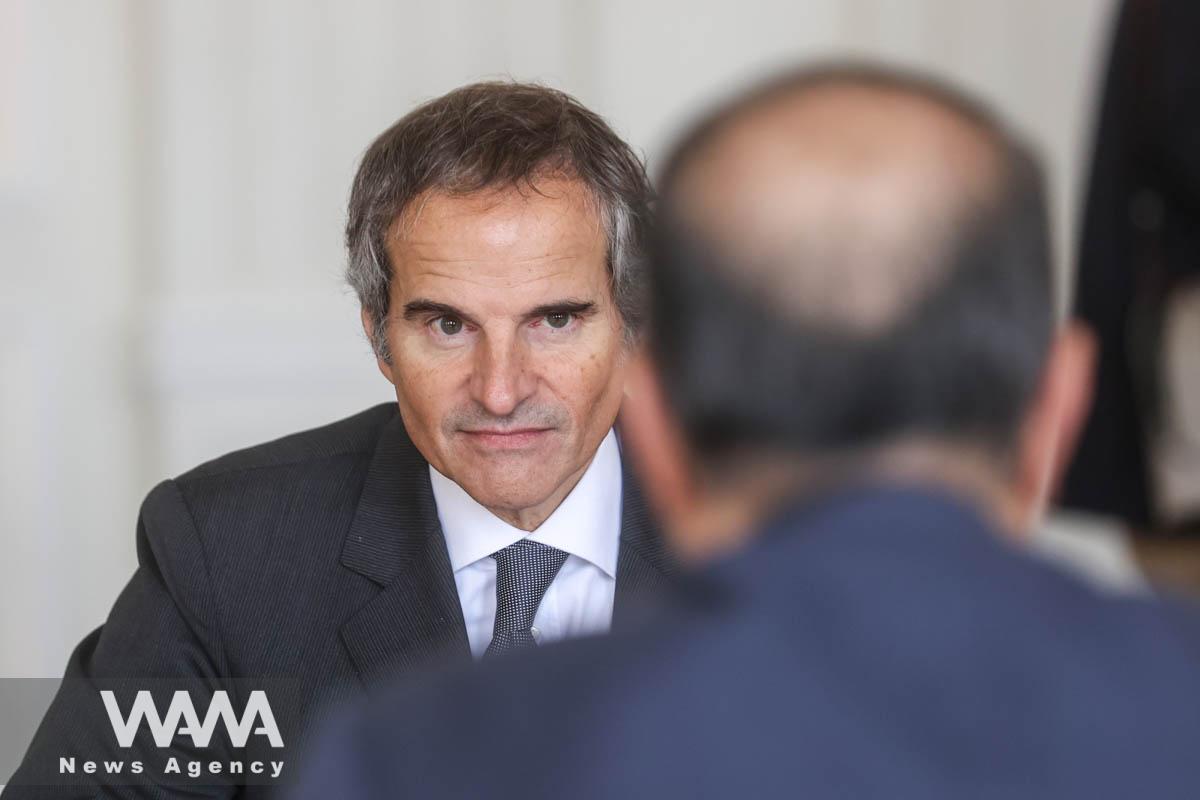Will the Iran-IAEA Agreement Prevent a Resolution at the Board of Governors?
WANA (Nov 18) – It is anticipated that Iran’s cooperation with the International Atomic Energy Agency (IAEA) during Director-General Rafael Grossi’s recent visit to Tehran, especially in granting permission for inspections of the Natanz and Fordow sites, may pave the way for future political negotiations over sanctions relief.
Last week, Rafael Grossi, Director-General of the IAEA, made a long-awaited visit to Iran to meet with senior Iranian officials.
Grossi’s visit took place just before the release of the IAEA Board of Governors’ quarterly report on Iran’s safeguards activities and JCPOA compliance, as well as ahead of the Board’s meeting scheduled for next week.
The significance of this visit was heightened by Donald Trump’s re-election as U.S. president and increased pressure from the three European countries (UK, France, and Germany) on Iran within the Board of Governors. These countries have been pushing Iran for greater cooperation and have threatened to issue a resolution against Tehran at the upcoming meeting.
Grossi was initially scheduled to visit Iran in May, but the trip was canceled due to the helicopter crash involving the late Iranian President’s delegation. Subsequently, domestic and regional political developments further delayed his visit.

President Pezeshkian: The World Has Realized Iran Seeks Peace and Security
WANA (Nov 14) – President Masoud Pezeshkian stated that “Iran’s pursuit of nuclear technology fully aligns with the legal frameworks and authorizations of the International Atomic Energy Agency (IAEA),” adding that Iran is open to collaboration with the IAEA. He emphasized that the international community now understands that Iran is committed to promoting global peace […]
Grossi’s Meeting with President Pezeshkian: Iran Signals Readiness for Cooperation
Rafael Grossi described his meeting with Iranian President Masoud Pezeshkian as “an opportunity to engage with the new Iranian government.” He noted, “Meeting with Iran’s president allowed me to hear his views and explain my approach and efforts on one of the most challenging international issues.”
In response, President Pezeshkian emphasized that “Iran’s nuclear pursuits are strictly within the framework and legal authorizations of the IAEA” and expressed, “Iran is ready to cooperate and align with the IAEA, even as the world increasingly recognizes that the Islamic Republic of Iran seeks global peace and security.”
Grossi’s two-day visit to Iran included three main components: meetings with the President and Foreign Minister, technical and safeguards discussions with the Atomic Energy Organization of Iran (led by Mohammad Eslami), and inspections of two key uranium enrichment sites at Natanz and Fordow.
This marked the first time an international political figure visited the Fordow site since its establishment. Previously, in March 2003, Mohamed ElBaradei toured Natanz, and in September 2015, the late IAEA chief Yukiya Amano visited the military site at Parchin as part of JCPOA negotiations to address the Possible Military Dimensions (PMD) dossier.

Grossi Visited Fordow and Natanz
WANA (Nov 15) – The Director General of the International Atomic Energy Agency (IAEA) visited the Shahid Alimohammadi (Fordow) and Shahid Ahmadi Roshan (Natanz) nuclear sites on Friday during his trip to Tehran. Rafael Grossi, who has traveled to Iran, held meetings and discussions with Iranian officials on Thursday. During this visit, the […]
The IAEA Director-General’s visit to Iran’s major enrichment facilities holds both technical and political significance, particularly amid increasing threats from European countries and the U.S. to undermine ongoing Iran-IAEA interactions, coupled with rising regional and global tensions.
The three European nations—UK, France, and Germany—have intensified pressure on Iran in recent months, demanding additional JCPOA and extra-safeguards cooperation, which Tehran categorically rejects.
Meanwhile, discussions between Iran and the IAEA regarding two specific sites, agency inspectors, and requests for enhanced monitoring measures have seen limited progress recently. This is critical as the JCPOA approaches a pivotal eighth year in 2025, during which six U.N. Security Council sanctions resolutions against Iran are set to be lifted under Resolution 2231.

International Atomic Energy Agency (IAEA) Director General Rafael Grossi entered a meeting with Iran’s Foreign Minister Abbas Araqchi in Tehran, Iran, November 14, 2024. Majid Asgaripour/WANA (West Asia News Agency)
Iranian officials are striving to maintain a collaborative atmosphere, both technically and politically, with the IAEA and JCPOA participants, even though the nuclear agreement is effectively not being implemented by either side.
Ahead of the Board of Governors’ quarterly meeting, the three European countries once again threatened Iran with a resolution, aiming to leverage it as a step toward referring the matter to the U.N. Security Council or as a pretext to extend existing U.N. resolutions against Iran. In cases where they failed to build consensus for a resolution, they have resorted to issuing harsh joint statements against Iran in both the Board of Governors and the Security Council to maintain pressure on Tehran.
Europe’s Efforts to Pressure Iran Are Not Tied to Trump’s Election
Amirali Abolfath, an Iranian expert on U.S. affairs, clarified the current European and American stance toward Iran at the IAEA Board of Governors. He emphasized that Europe has been creating difficulties for Iran for some time now, and this is nothing new. In previous Board of Governors meetings, through joint statements and even resolutions against Iran, the three European countries (UK, France, and Germany) have played a significant role.
Addressing speculations about a possible new resolution against Iran, Abolfath stated: “This effort and determination to put more pressure on Iran are not related to Donald Trump’s election as the new U.S. president. Even if Kamala Harris had won, they would have pursued the same path.”

International Atomic Energy Agency (IAEA) Director General Rafael Mariano Grossi shake hands with Head of Iran’s Atomic Energy Organization Mohammad Eslami during a news conference in Tehran, Iran, November 14, 2024. Majid Asgaripour/WANA (West Asia News Agency)
The Root of European Pressure on Iran Goes Beyond U.S. Politics
Abolfath stressed that Iran’s relationship with Europe is inherently challenging, with or without Trump’s presence. He doesn’t believe that Europeans will stop exerting pressure on Iran in international forums, noting that the disagreements between Iran and Europe run much deeper than the current political landscape.
He also rejected the notion that the Biden administration has been unwilling to take harsh actions, such as issuing a resolution against Iran. He argued that if the Biden administration hasn’t pursued aggressive measures in the past or during the current political transition, it’s due to strategic interests rather than a lack of intent. According to him, “If Biden’s administration could have toppled the Iranian regime, increased sanctions, or applied more political pressure, they would have done so. The fact that they didn’t indicates either their limitations or larger strategic considerations.”
Impact of Trump’s Election on Biden’s Policy During the Transition Period
Abolfath explained that this dynamic applies to all U.S. administrations, including Trump’s. “Trump will certainly try to take action, but whether he succeeds remains uncertain. Every U.S. president since the Iranian Revolution has attempted to act against Iran. If Biden couldn’t bring Iran’s oil exports to zero, it wasn’t for a lack of desire but rather because he either lacked the capability or was constrained by other interests.” Abolfath also expressed doubt about Trump’s ability to successfully pursue a “maximum pressure” campaign in this term, even if he intends to escalate it further.

International Atomic Energy Agency (IAEA) Director General Rafael Mariano Grossi and Head of Iran’s Atomic Energy Organization Mohammad Eslami attend a news conference in Tehran, Iran, November 14, 2024. Majid Asgaripour/WANA (West Asia News Agency)
The U.S. Must Address Its Issues with Russia and China Before Confronting Iran
Abolfath highlighted the significant changes in global dynamics over the past four years, making it unlikely for the U.S. to achieve its objectives with Iran without first resolving its conflicts with Russia and China. “The U.S. cannot hope to reach a resolution on Iran while it’s engaged in a proxy war with Russia and an economic confrontation with China. Naturally, this pushes Russia and China to support and align more closely with Iran,” he said. Thus, if the U.S. wants to take a serious stance against Iran, it must first address its issues with these major powers. “Sanctioning or isolating a country like Iran, which is a key producer of strategic commodities, is not feasible.”
The Transition Period in the U.S. Focuses on Routine Affairs
Abolfath argued that during transition periods in the U.S., administrations generally stick to routine affairs and maintain normal relations with both allies and adversaries. “Whatever Biden would have done regarding Iran, he will continue to do during this transitional period.”
He concluded that it’s unlikely the U.S. will engage in high-risk or provocative actions in the remaining month and a half before the power transfer. “Whether in domestic or foreign policy, the approach will likely stay the same until the next administration takes over,” he added.
No Reconciliation or War on the Horizon
Finally, Abolfath asserted, “Neither the U.S. nor the Europeans are likely to reconcile with us or go to war against us during this period. It’s also improbable that Trump’s administration will change its approach. The priority for Americans, especially with a new administration starting, will be on domestic issues first, before turning to foreign policy challenges.”

Will the Knot in Iran and the IAEA’s Relations be Untied?
WANA (Nov 14) – Amid a period of considerable ups and downs in the past six months between Iran and the International Atomic Energy Agency (IAEA), Rafael Grossi’s trip to Tehran, as the director general of the IAEA, carries substantial significance. This visit has the potential not only to impact bilateral relations but also to […]
Iran is Not Trump’s Priority, With or Without the JCPOA
Amirali Abolfath, an expert on U.S. affairs, emphasized that Iran, whether under the Joint Comprehensive Plan of Action (JCPOA) or not, is not a priority for Donald Trump. He argued that Trump’s focus lies elsewhere, such as the war in Ukraine, issues with China, and conflicts in Gaza and Lebanon. According to Abolfath, only after addressing these challenges will the U.S. turn its attention to Iran.
U.S. Withdrawal from the JCPOA Amid Political Transition
While Rafael Grossi’s visit to Iran is seen as crucial for advancing technical cooperation between Iran and the International Atomic Energy Agency (IAEA) and potentially unblocking political negotiations, it appears that the political groundwork for resolving technical issues and restarting talks on sanctions relief or implementing the JCPOA (or an updated version) is still lacking.
Both Iranian officials and representatives from the IAEA, the three European countries, and the U.S. are aware of this reality. Unfortunately, these countries seem intent on exploiting the political transition period in the U.S. to intensify pressure on Iran under the pretext of taking advantage of the shifting dynamics in Washington.

Important Talks Between Araqchi and Grossi on Iran’s Nuclear Program
WANA (Nov 14) – This morning, Abbas Araqchi, Iran’s Deputy Foreign Minister, and Rafael Grossi, Director General of the International Atomic Energy Agency (IAEA), held significant discussions regarding Iran’s nuclear program. Baghaei, spokesperson for Iran’s Foreign Ministry, announced the news, stating: “These discussions are part of Iran’s ongoing cooperation with the IAEA to clear […]
Grossi’s Discussions with Araghchi: Europe’s Pressure Tactics Amid the Ukraine War
According to the IAEA’s periodic reports, Iran’s nuclear activities are proceeding in an orderly and logical manner under the framework of the Comprehensive Safeguards Agreement and the Nuclear Non-Proliferation Treaty (NPT), with no immediate concerns.
However, European countries are trying to leverage the pressures from the Ukraine conflict to offset their own failures against Russia by intensifying accusations and threats against Iran. They have taken steps to blame Iran at the IAEA Board of Governors and the U.N. Security Council, aiming to potentially extend U.N. Security Council resolutions against Iran.

International Atomic Energy Agency (IAEA) Director General Rafael Grossi meets with Iran’s Foreign Minister Abbas Araqchi in Tehran, Iran, November 14, 2024. Majid Asgaripour/WANA (West Asia News Agency)
Technical Talks Between Iran and the IAEA in Tehran
It appears that during the technical talks between Iran and the IAEA held last Thursday in Tehran, both sides reached a minimal level of cooperation to maintain an atmosphere of dialogue. This cooperation allows both parties to move past the current phase and resume negotiations in a more constructive environment in the near future. Now, the ball is in the court of the Europeans and the Americans to respond to Iran’s goodwill and engagement.
Iran’s willingness to engage in dialogue, especially during this politically sensitive period, signals its intent to find a mutually beneficial solution. However, whether the West reciprocates remains to be seen, as they face mounting internal and external pressures that could shape their next moves.












